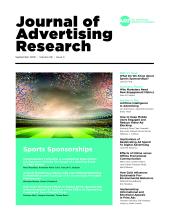ABSTRACT
To motivate shoppers to bring reusable bags, England has enforced a carry-bag law, allowing large retailers to charge five pence (£0.05) for a single-use plastic bag. Few studies have addressed the role of guilt in influencing sustainable pro-environmental behaviors among shoppers. The current study investigates two primary questions: Do male and female shoppers perceive guilt differently? Can guilt in an advertising context motivate shoppers to bring reusable grocery bags? Survey findings from Study 1 showed that high guilt was more impactful on women and helped generate favorable attitudes and behavior. The experiment for Study 2, based on the theory of psychological ownership, elicited a moderate level of guilt using advertisements related to egoistic and biospheric concerns. Findings showed that egoistic concerns, such as saving money, were more effective and that this effect was stronger for women than men. Theoretical and managerial implications are discussed.
- Received April 7, 2016.
- Received (in revised form) August 26, 2016.
- Accepted November 11, 2016.
- Copyright© 2018 ARF. All rights reserved.
ARF MEMBERS
If you are a member of the Advertising Research Foundation, you can access the content by logging in here
Log In
Pay Per Article - You may access this article (from the computer you are currently using) for 30 days for US$20.00
Regain Access - You can regain access to a recent Pay per Article purchase if your access period has not yet expired.







